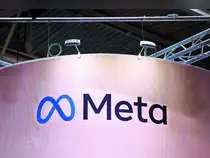![]() Newsflash:
Newsflash:
U.S. tech stocks slide on AI bubble fears10:45 AM
Government Shutdown Halts SNAP Benefits 8:00 AM
UPS Cargo Plane Crash in Kentucky Kills 7 2:45 AM
Democrats Gain in 2025 State Elections 10:00 PM
USPTO Stays Open Amid Federal Shutdown 9:30 AM
US–China Reach Rare-Earth Trade Accord 11:15 AM
Clocks “Fall Back” as Daylight Saving Time Ends 2:00 AM
Federal Government Shutdown Surpasses Historic Milestone12:01 AM
Insurtech Firm to Release Q3 Results 5:00 PM
“Make-or-Break Day” for Millions’ Finances 12:00 AM
SpaceX Prepares for next-icon Starship Launch 10:14 am

Some people think that Meta Platforms generated money by putting phony ads on Facebook and Instagram, thus the U.S. Securities and Exchange Commission is looking into the company. Regulators want to see if Meta did a good job of describing the financial risks and how many fraudulent ads were on its sites. They also want to see how successfully the company's automated system could discover and get rid of false information. Many individuals are now even more worried about how safe and open Meta's advertising system is for investors, consumers, and regulators.
Federal investigators are looking into whether Meta made money from fake advertisements on Facebook and Instagram and whether they told investors about the risks. The examination is mostly about how safe and clear Meta's ads are and how well it can stop fake ads from appearing on its platforms.
Straight News Report
The SEC is looking into Meta Platforms because they suspect the company made money by running phony ads on Facebook and Instagram. Regulators want to see if Meta did a good job of warning people about the dangers of fraudulent ads, like celebrity impersonations and fake investment schemes.The probe also looks into whether Meta's paperwork accurately showed how big the scam was. People who don't like the company say it hasn't done enough to stop copycat schemes. Meta said it is working with the police and still employs automatic detection technologies to get rid of ads that contravene the rules.
Business & Financial Impact
Wall Street is taking notice because the SEC is looking at Meta Platforms. This makes people question the company's risk disclosures and the honesty of its advertising approach. If investigators identify differences between internal data and public investor statements, financial analysts think that the probe might lead to greater compliance expenses, revisions to reporting standards, or possibly fines.This issue comes up just when Meta is working hard to make its shopping and advertising services driven by AI. If there were to be an investigation into how scam advertising got into the company's systems, it might make people doubt the company's long-held claim that its automated processes kept users and brands secure.Investors were apprehensive because they recognized that the inquiry wouldn't have a large effect on Meta's revenue growth, but it could mean increased government oversight at a time when digital ad markets are already very unstable.
Consumer Protection Angle
Consumer advocates were happy to hear that the SEC is looking into Meta Platforms. They said that the company's advertising model has long allowed scam content to grow rapidly before anyone steps in. People in a number of countries have said that they lost money to phony celebrity endorsements, fake investment schemes, and fake e-commerce opportunities that were advertised through paid ads on Meta's platforms.Critics say that Meta's detection methods often miss hazardous information, which lets scammers buy ad space that seems real to those who don't know any better.
Meta says it quickly removes ads that break the rules, but advocacy organizations say the firm hasn't done enough to stop repeat offenders or make it clear what happens when rules are broken. The SEC will look into whether Meta understated these risks in conversations with investors and if the firm did a good job of warning customers and shareholders about the high number of fake ads.
"The SEC has opened an investigation into Meta Platforms over allegations that it profited from scam advertisements on Facebook and Instagram. Regulators are examining whether Meta failed to fully disclose the risks tied to deceptive ad activity."
Breaking News
The probe focuses on how much scam advertising circulated on Meta’s platforms and whether any related revenue was reflected accurately in company filings. Investigators are also reviewing Meta’s ad-screening systems and their effectiveness in blocking fraudulent content. Consumer groups have long criticized the company for allowing impersonation scams to spread widely. Meta says it is cooperating with regulators and continues to remove ads that violate its policies.
Outlook..
The SEC's investigation is making things hard for Meta. It could also change how people feel about ads on the internet in the future. If the investigation finds that Meta's reporting or moderation methods aren't good enough, the company could get in trouble, be told to change how it reports things, or have to follow stricter rules for keeping an eye on ads. If Meta can show that it did business in a fair and open way, it might not have to pay a lot of fines. But it still needs to be clearer. People who live and work in the area think the government should do a better job of teaching people how to tell the difference between real and fake ads and how bad content can cost them money.People might not be able to agree on what platforms should do to find fraud, keep users safe, and let investors know about the risks that will come after the decision. This could have an impact on Meta and the entire online advertising industry.

Morgan Blake
Morgan Blake is a U.S. investigative journalist specializing in government accountability, corporate misconduct, and public-interest reporting.p>